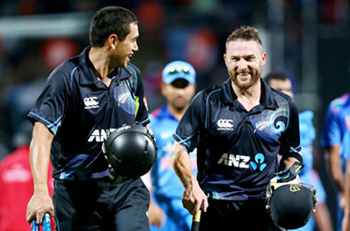 Hamilton, Jan 29: Revealing New Zealand's strategy that has outwitted Indian bowlers in the ongoing ODI series, batsman Ross Taylor said the Kiwis have focussed on denying wickets to the visiting side's spinners to wear out the rest of their attack.
Hamilton, Jan 29: Revealing New Zealand's strategy that has outwitted Indian bowlers in the ongoing ODI series, batsman Ross Taylor said the Kiwis have focussed on denying wickets to the visiting side's spinners to wear out the rest of their attack.
The Kiwis have taken an unassailable 3-0 lead in the five-match series after comfortably winning the fourth ODI here yesterday.
The highlight of their effort in the series has been the way Taylor and Kane Williamson have combined to counter the Indian bowling in the middle overs to repeatedly lay down the platform for tall scores.
The one time they batted second, yesterday, the Taylor-Williamson combination once again proved to be the game-changer.
"Yesterday was pretty tough against the spinner. Against (Ravindra) Jadeja, I don't think we laid a bat on ball in those first couple of overs. He bowled very well, on another day, he could have got a couple of wickets and stifled our momentum," said Taylor.
"In the past, I have played a few years in India and in New Zealand, it doesn't really turn as much and you just lunge on the front foot. But now our strategy has been to play off the back foot as much as possible and play into the gaps.
"Kane is a very good player of spin and we knew then that if we could negate them, we gave ourselves the chance to put pressure on their fifth and sixth bowler and that's what we did," he added.
Taylor said he aspires to be a consistent batsman in international cricket. He scored his ninth one-day hundred in the fourth ODI versus India.
"I have been trying to get into a mindset and a routine, and just play ball by ball," Taylor said, after his match-winning knock at Seddon Park.
"I have played enough international cricket to know my strengths and weaknesses, and just to give myself the best chance to be as consistent as possible. In the past, I have probably been consistent in a couple of games and been quite inconsistent for a few, so I want to try and be as consistent as possible."
"The captain has said that my job is to try and bat through the middle overs, and give our power-hitters as much chance to try and express themselves in the last 15 overs. The way Kane (Williamson) has been batting has helped me along the way as well," Taylor added.
His partnership with Williamson has paid rich dividends for New Zealand, with the two batsmen putting up 121 and 130 runs in the first and fourth ODIs respectively, as also a half-century partnership in the second ODI.
For Taylor, the journey has been about going from being a hard-hitting batsman to becoming a seasoned campaigner, and his current maturity in the batting line-up is just a pointer of the same.
He was worked hard on his technique, cutting out the slog-sweep shot and tightening up his game on the off-side to play a crucial role at number four for his side.
"It has taken 29 years for me to control that shot," he said jokingly.
"Seriously though, I have been working at it for a while, just trying to work the top hand. I wouldn't say I have lost it completely and I am starting to go back to it because we have a big tournament on in a couple of weeks' time, the T20 World Cup, so I am starting to bring it out at training.
"It's been pleasing though, it's nice to be able to hit to other areas and give the opposition team something else to think about."
Before that tournament in March-April though, New Zealand have to contend with India in a two-Test series starting in Auckland on February 6.
Given the form he is in, Taylor will have to play an important role in the longer format as well. Even so, there is the odd chance that he might miss either of the two Test since his second child is due to be born at the same time.
"I am just taking things day by day. Hopefully, the baby will play ball and come in between the first and second Test, that will be really good," Taylor signed off.





Comments
Add new comment